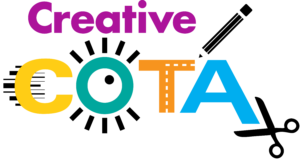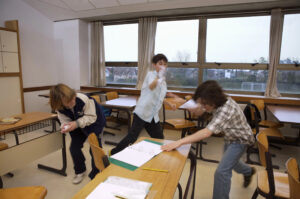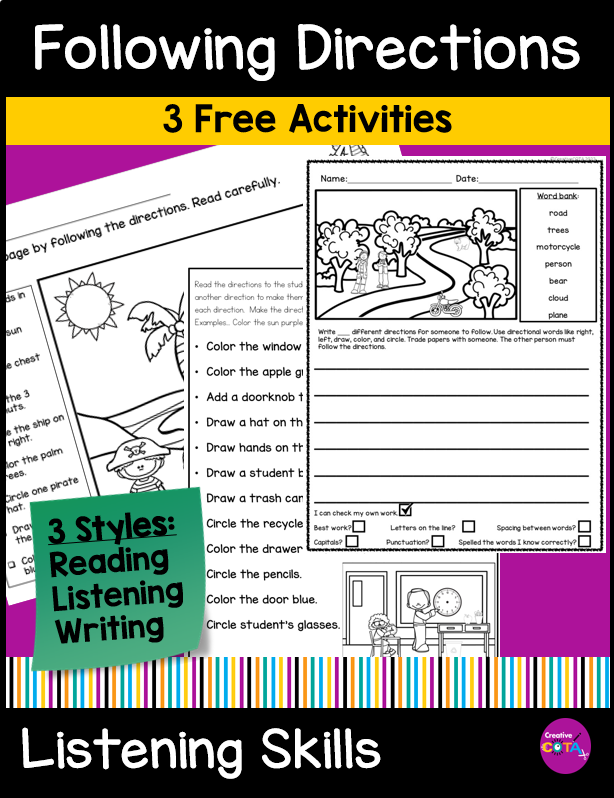
School jobs are a great way for students to build academic, vocational, self-help, and functional skills. They also give students a sense of purpose and responsibility.
Many IEP goals can be worked on during a school job. In my experience, they have been great when run with an Occupational and Speech therapy co-treatment time to meet IEP units.
Consider having typical peer helpers. You don’t want others to think the “menial” jobs are only done by special education students.
Getting your faculty and staff on board is very important.
There are so many jobs that can help out a school community. Jobs can be daily, weekly or monthly and are great for building community service opportunities along with skill building. Daily jobs can be monitored by a teaching assistant, peer, or special education teacher.
You will need to match the skills of your students with the jobs they can do successfully and adjust the amount of support needed.
Junior custodians:
Activities: Wiping tables, sweeping, putting up chairs, emptying recycling, cleaning door knobs, doing laundry (PE clothes, rags)
Skills: So many skills in each task. Bilateral hand use, daily living skills, gross motor, heavy work for sensory input, sorting…
Coffee cart:
You will need staff participation and some start-up money for this. Send an email out to staff letting them know what day/days of the week this will be offered. Create an order form, including things like regular or decaf, how much cream or sugar. (we got donations from our PTO to get this started)
Activities: reading orders, making coffee to order, deliveries, keeping track of supplies,
counting money, ordering supplies…
Skills: executive function, reading skills, handwriting, math skills, organization, navigation, activities of daily living, communication
Snack cart:
You will need staff participation and some start-up money for this. Send an email out to staff letting them know what day/days of the week this will be offered. Create an order form with the items offered.
Activities: taking orders, deliveries (map skills), keeping track of supplies,
counting money, ordering supplies
Skills: executive function, reading skills, handwriting, math skills, organization, navigation, activities of daily living, communication
Lost and found:
Activities: Students maintain, organize, and clean up the lost and found.
Skills: ADL skills (folding, sorting, zippers, hanging…) use folding boards.
Another idea: Take pictures and make slides for teachers to share with students. Every few months students can bag up unclaimed items for donation.
Mail delivery:
Activity: Staff signs up to have their mail picked up and delivered to them. Students check mailboxes and deliver mail once or twice a day.
Skills: reading, visual discrimination to find names, have magazine bins with the staff names on them that requested their mail delivered, navigation skills to find their rooms
Black mark floor cleaning:
Activity: Put a tennis ball on the end of a broomstick or ski pole and use it for a black mark hunt in the halls. Students rub the marks until they disappear
Skills: Works on visual discrimination and upper body strength.
Locker/hall monitor:
Activity: Have students look for things to straighten up in the halls. Close lockers, straighten out boots in the winter, use a reacher to pick up papers or trash, use a small broom and dustpan to sweep up trash.
Watering plants:
Activity: Teachers can sign up to have their classroom plants watered. Students have a schedule for each room they need to go to on a certain day.
Skills: Great way to work on pouring and proprioception.
Making copies/laminating:
To do bin. students complete the project and deliver.
Supply closet:
Activity: Teachers can check off what they need on a form that the students help create. Students can keep the closet organized, let staff know when things need to be re-ordered, and make deliveries…
Skills: executive function, reading skills, handwriting, math skills, organization, navigation, activities of daily living, communication…
Library helper:
Re-filing books, general clean up, stacking chairs at the end of the day…
Cafeteria helper:
Cleaning, wiping down tables, filling and organizing milk, snacks, and other coolers
Outdoor clean up:
Weeding, trash pick up, raking, planting…
About the Author
I am a Certified Occupational Therapy Assistant (COTA) and have been working in a public school system for more than 25 years. My resources can be found on TPT, BOOM Learning, Made by Teachers, Classful, and Your Therapy Source. I appreciate your interest wherever you wish to shop.
My mission is to help you find creative ideas to incorporate fine motor, visual perception, gross motor, and social-emotional learning into your lessons.
I hope you consider signing up for my Free Resource Library with your Email. I send out emails about once a week and share resources, tips, and planning ideas for your classroom or occupational therapy needs. Hopefully, these help your students work on building their skills in a fun and engaging way.
Thank you for your interest in my resources and ideas. I hope you will consider following my journey on TPT or wherever you wish to shop.






